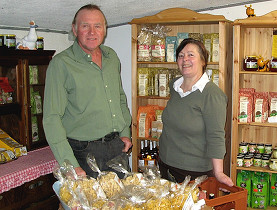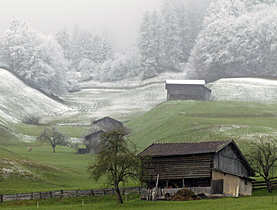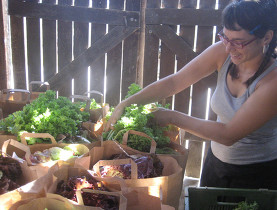Hunger for organic foods proves hard to satisfy

Organic food is more popular than ever in Switzerland but consumer enthusiasm is making it hard for producers to keep up with increasing demand.
At the same time, not all organic farmers are benefiting from the “bio” boom.
2008 was the organic food industry’s strongest ever year in Switzerland, with an 11.2 per cent increase in turnover to SFr1.44 billion ($1.24 billion), according to the organic farmers umbrella group, Bio Suisse.
In particular, organic fruit, meat and dairy products sold well last year. In its annual report, Bio Suisse also noted shortages of organic eggs and grain.
Currently, organically farmed land makes up 11.4 per cent of Swiss farmland.
Of the nation’s 6,111 organic farms, 5,589 are registered with Bio Suisse. Its criteria are somewhat stricter than those set by the federal government for organic farms.
Between 2007 and 2008, 62 farms dropped out of Bio Suisse. Some of those were run by retiring farmers with nobody to take over, while other farmers quit for different reasons. In the meantime, 60 new ones have come forward with plans to start converting their farms this year.
“Switzerland needs new organic farms, and the market could easily support a few hundred more,” said Jürg Schenkel, director of marketing for Bio Suisse.
“Bio Suisse intends to look into the reasons why many farmers are sceptical about going organic.”
Tricky conversion
Indeed, it’s not so easy being green. The process of becoming a certified Bio Suisse farm is a long one – two full calendar years at least.
Soil and plants need time to recover from any previous use of chemical or synthetic pesticides, herbicides and fertilisers. To keep their crops healthy, organic farmers use natural substances like hemp and manure. Of course, plenty of old-fashioned elbow grease is also required.
The regulations for the keeping and feeding of organic livestock are strict, too. For example, pigs must have outdoor access as soon as they are 24 days old, and farmers are not allowed to feed their animals restaurant leftovers.
To ensure that the rules are followed, inspectors visit the farms annually. The official inspection is by appointment, but there are occasional unannounced visits as well.
Is bigger better?
Ironically, the increasing popularity of organic food has been a mixed blessing for small farms.
In 2008, 74 per cent of organic food products were sold through the largest retailers, Coop and Migros. Just over five per cent of the market belonged to farmers selling independently.
Organic speciality shops account for about 15 per cent of the market.
“All the discounters and regular supermarkets want a piece of the [organic] pie, and that’s a disadvantage for us,” said Martin Wigger, who has been farming organically since 1987, when he took over his father’s farm.
Set on a slope in Dierikon, Lucerne, Wigger’s orchard has 220 cherry, apple, pear and plum trees. Biohof Wiedacher is also home to cattle and sheep – about 50 animals altogether.
But at just 20 hectares, Wigger’s farm is too small to produce quantities large enough to interest a big retailer.
“It’s getting more industrialised these days,” said Wigger of organic farming, pointing out how many items are imported from Spanish greenhouses. Later, they are wrapped in plastic to ensure that they don’t get mixed with conventional produce.
Price wars
Meanwhile, the food industry’s price wars have driven down profits for producers.
“Food costs the same now as it did 20 years ago. We used to get more for our cherries,” said Wigger. He and his wife sell their products directly to the public.
But when consumers can stock up on organic fare at the supermarket, they may feel less inclined to stop at a farm stand. To make the trip to their farm worthwhile, the Wiggers have teamed up with other organic producers to offer a broader assortment of wares in their two-room shop.
“Our goal is to keep going – maybe even open a little garden café or a children’s zoo. That’s the way to survive,” said Wigger.
To help promote small farms, Bio Suisse has launched an internet portal where consumers can search for organic farm stands and markets in their area. There are currently about 550 listed at www.knospehof.ch, many with their own websites.
swissinfo, Susan Vogel-Misicka
Sales increased 11.2% in 2008 to SFr1.44 billion, according to the annual report for the organic farming umbrella association Bio Suisse.
Out of a total of 6,111 organic farms, 5,589 were run according to Bio Suisse priniciples. the organisation’s criteria are somewhat stricter than those set by the federal government for organic farms.
Organic farms represented 11.9% of all farming organisations in the country.
The most popular products were eggs and cereals.
Switzerland’s largest and most important organic festival is celebrating its tenth anniversary from June 19-21. It is always held in Zofingen, Aargau, and it draws about 35,000 people a year.
It offers an array of fruit, vegetables, dairy products, condiments and other organic fare.
In addition to edibles, the market also features cosmetics, textiles and a section devoted to organic building and living. Meanwhile, the entertainment programme is packed with surprises for young and old, such as concerts and a zoo.

In compliance with the JTI standards
More: SWI swissinfo.ch certified by the Journalism Trust Initiative



You can find an overview of ongoing debates with our journalists here. Please join us!
If you want to start a conversation about a topic raised in this article or want to report factual errors, email us at english@swissinfo.ch.